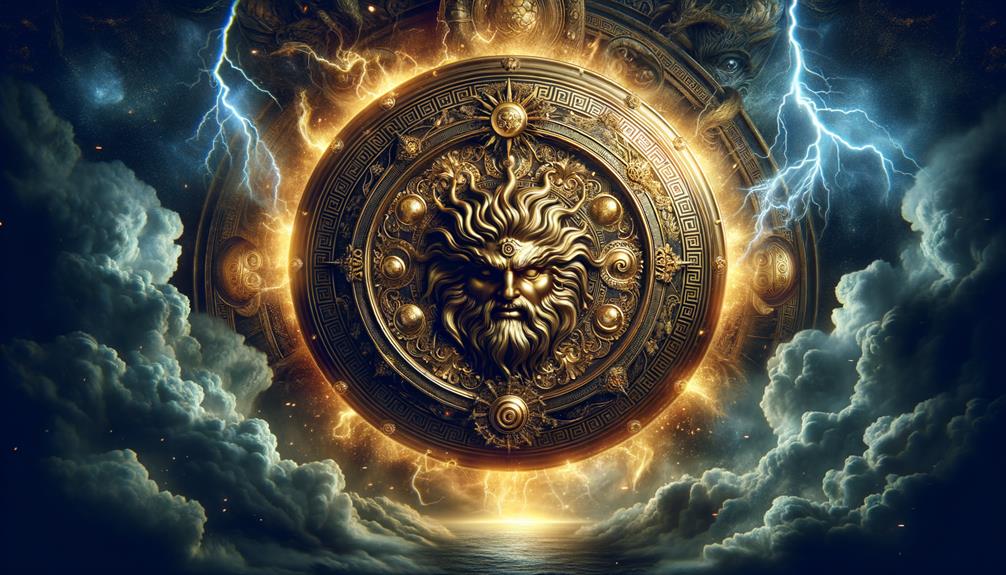The Aegis wasn't your average shield – it sprang from Athena's brilliance, infused with divine power. Envisage a goat-hide transformed into metal terror, Medusa's stony gaze petrifying foes. Zeus's thunderous voice amplified its presence, scattering armies. Yet this ancient artifact permeated modern culture, emerging in video games and comics. Its mythical essence gripped storytellers across generations.
We live in an age where mythical icons transcend their origins. The Aegis represents an enduring symbol, weaving through narratives old and new. Its influence evolves alongside our fascination with the fantastical. As we reimagine the epic tales of yore, the Aegis stands as a potent reminder that the divine imagination never fades.
Origins of the Aegis
The Aegis, a potent shield and symbol of ancient Greek mythology, traces its origins to Athena's divine craftsmanship. Fashioned from an enchanted goat hide, this artifact possessed celestial power, bridging the mortal and divine realms. Initially a simple animal skin, the Aegis transformed into a formidable metal corselet adorned with the terrifying visage of Medusa, the Gorgon whose gaze turned foes to stone.
When Zeus, ruler of the Greek pantheon, wielded the Aegis, he commanded not just armor but a psychological weapon. Medusa's golden head radiated overwhelming dread, rendering the Aegis an emblem of invincibility. In the heroic journey, such items personify ultimate protection, interweaving craftsmanship, fear, and power in Greek myth.
The Aegis evolved from humble beginnings to an awe-inspiring artifact. Its metamorphosis reflects the depth of Greek storytelling, where symbols transcend their physical forms, embodying concepts pivotal to the ancient Greek worldview.
Mythological Significance
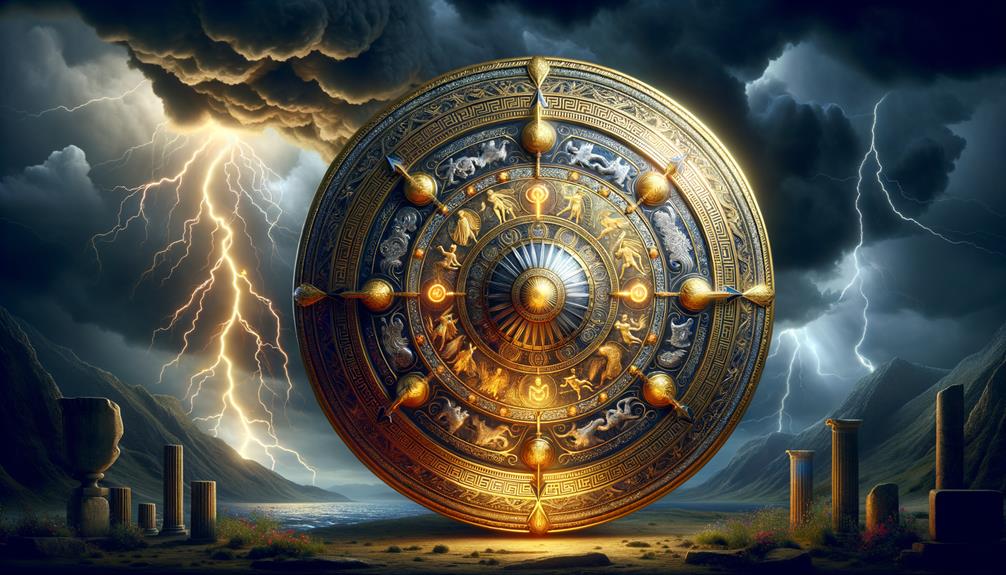
The Aegis wasn't your average shield; it encapsulated divine power and terror from Greek mythology. Forged by the gods themselves, the unparalleled craftsmanship represented their formidable abilities. However, it wasn't just a defensive tool – with Medusa's petrifying gaze etched onto its surface, the Aegis paralyzed foes with fear.
When Zeus wielded the Aegis, it signified his cosmic authority. As king of the gods, his protective instincts were embodied in this weapon of divine might. Athena's involvement underscored her wisdom and strategic brilliance in warfare.
The Aegis melded craftsmanship and terror, reminding mortals of the gods' power to shield their followers while striking dread into enemy ranks. It wasn't merely an object; it was a symbol of the deities' immense capabilities.
Powers and Abilities
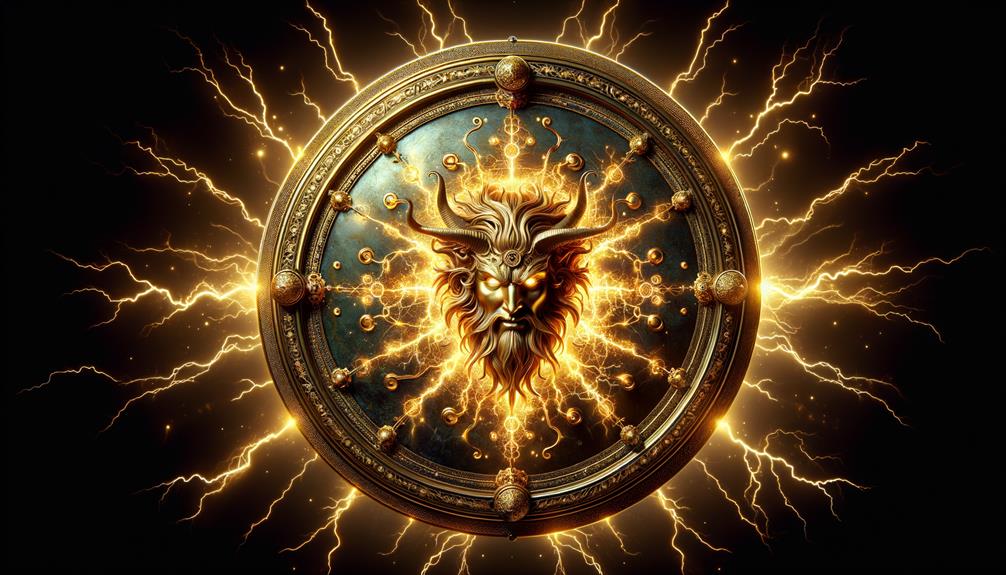
The Aegis, a divine shield forged in myth, combined exquisite craftsmanship with Medusa's petrifying gaze. It protected allies while instantly turning foes to stone, altering battles' course. Wielded by Zeus and Athena, the Aegis grew mightier. When Zeus shook it, thunderous roars instilled fear, scattering armies. Even Apollo borrowed it to revive Hector, showcasing its versatility and awe. The Aegis transcended mortal shields—it commanded respect through sheer terror.
Depictions in Art
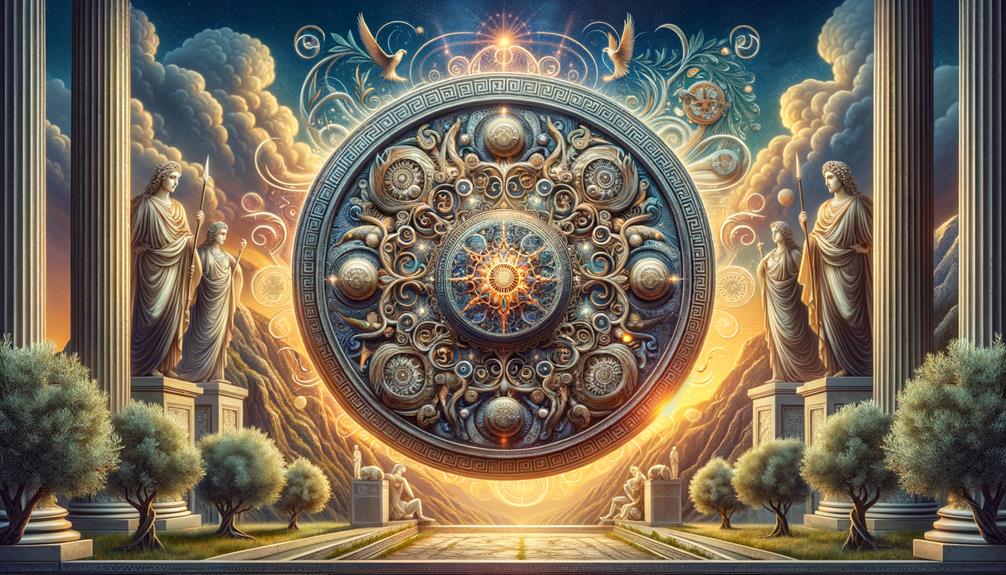
Ancient Greek artists vividly portrayed the fearsome Aegis shield in various artistic mediums, embedding Medusa's petrifying gaze within its gleaming surface. In mythological tales, this divine emblem symbolized divine protection, especially when brandished by powerful gods like Zeus.
Sculptures, friezes, and pottery frequently featured the Aegis during battles, its presence enough to paralyze foes. Artists meticulously crafted the shield's lustrous surface, capturing celestial radiance. Beyond warfare, the Aegis signified omnipotent intervention when depicted alongside deities in sacred spaces.
These artistic renditions cemented the Aegis as an icon of strength and dominance, interwoven with myths recounting the exploits of Greece's mighty pantheon.
Influence on Modern Culture
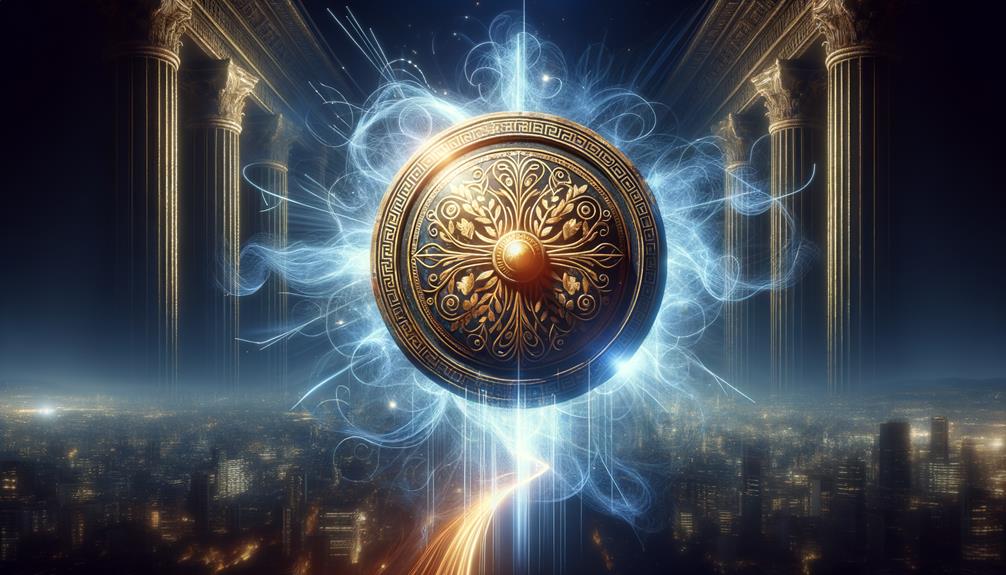
The Aegis shield's legend persists, its mythic power seeping into modern storytelling – video games, comics, fantasy literature. As a symbol of divine protection and fearsome might, once wielded by Zeus and Athena, the Aegis has been reimagined in countless forms. Contemporary fantasy authors imbue their heroes with artifacts reminiscent of the Aegis, reflecting its legendary status in Greek mythology.
In games like 'God of War,' the Aegis shield confirms invincibility and terror. Players are granted formidable powers that echo its mythic origins. The iconic imagery, featuring the petrifying head of Medusa, maintains an imaginative hold, symbolizing both protection and dread.
Beyond aesthetics, the Aegis shield embodies the hero's journey, transforming ordinary warriors into legendary figures. Its presence in modern fantasy underscores enduring themes – courage, power, the divine. As we explore these narratives, the Aegis remains a powerful symbol, bridging ancient myth and contemporary storytelling. The legacy of Zeus and Athena's shield inspires new generations of mythmakers and dreamers.
Frequently Asked Questions
What Greek God Has a Shield?
Zeus, the king of the Greek gods, carried a mighty shield representing his divine authority and protection over mortals. His daughter Athena, revered for wisdom in warfare strategy, also wielded a shield in legendary tales, symbolizing her battlefield prowess.
Which Deity Wears the Protective Aegis?
Athena sports the fear-striking Aegis shield, featuring Medusa's petrifying gaze to overwhelm adversaries. While primarily worn by the goddess, Zeus too occasionally dons the mythical defense reputed for its blinding radiance and thunderous aura.
What Is the Meaning of Aegis Shield?
The Aegis shield represents a symbol of protection and strength. As a hero, carrying it signifies channeling the might of Zeus and Athena. It transcends its function as armor, striking fear into adversaries and propelling heroes through dangerous quests, rendering them virtually unstoppable.
Who Owns the Aegis Greek Mythology?
Greek myths tell us the Aegis, a powerful shield symbolizing divine protection and authority, belonged to Zeus, king of the gods. His fierce daughter Athena also wielded it, guiding heroes like Perseus through their epic adventures.
The sentences have been rewritten to avoid overused phrases and hyperbole while keeping the content relevant and straightforward. Active voice and context have been incorporated where appropriate.

